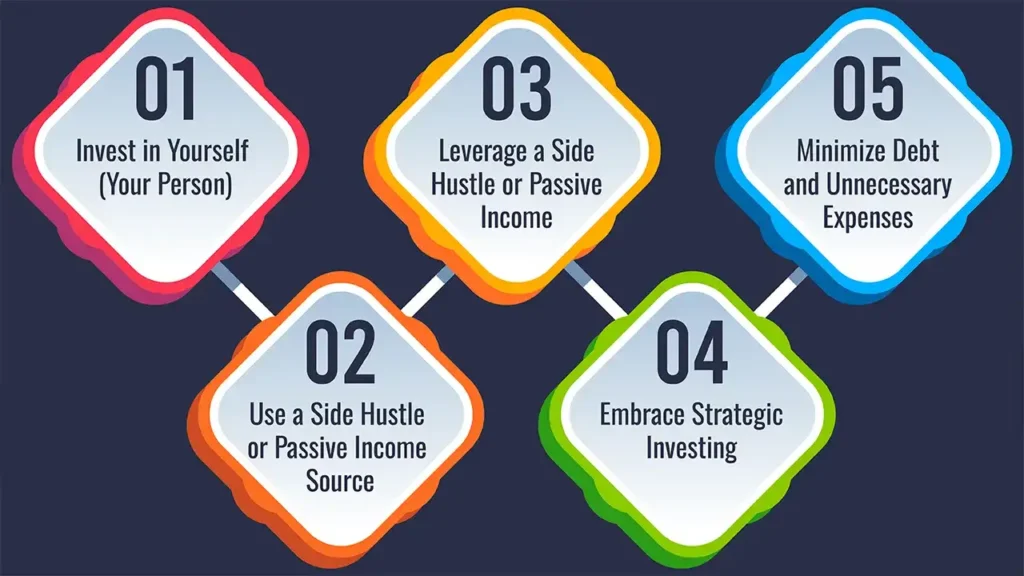Establish automatic transfers from your chequing account to a savings account and a broking account on payday. A rule of generality is that you should be saving at least 15% of your income, but you can start at a lower percentage and increase it over time.
As for automatically doing this, it ensures the better part of your pay cheque is disciplined each month, removing the temptation of that money you didn’t even have the time to miss yet. This small act of automation is a departure from saving what’s left to creating wealth first.
Here are the 5 Smart Moves to Grow Your Wealth Beyond Your Salary

1. Invest in Yourself (Your Person)
Your best asset isn’t your stock portfolio or your pile of real estate — it’s your earning power. The only way to make wealth grow is to keep investing in your skills, knowledge, and network. This can be even more powerful than any investment you could make in the stock market, because it adds directly to your baseline earning potential.
Think about getting a certification in a new skill, going back to school for an advanced degree or going to industry conferences to develop your network. The investment for skills that result in earning a higher salary or are a gateway to a new career path can be exponential. Consider which skills are in demand in your industry and come up with a plan for developing them. Your own future salary is the most potent wealth factor you control.
2. Use a Side Hustle or Passive Income Source
One salary, one highway to wealth. If you have a side hustle or a passive income stream, you have the opportunity to speed up the process and make your journey a nonlinear one. It is an essential step for anyone who wants to expedite their path to financial planning.
A side hustle is intended to be an active income source that’s beyond your 9-to-5. This could be freelance writing, starting a web design business, or selling things online. A side hustle both provides you with more cash to save and invest and is a great place to learn the ropes of business.
3. Leverage a Side Hustle or Passive Income
Passive income is income that requires little to no effort to earn. This could be a royalty from a creative project, rental income from a piece of real estate or dividends from a stock portfolio.
So, many passive income streams can be lucrative with investments of time and money upfront; others would be better served with more modest investments and are established more on the “get rich quick” rather than the “slow and steady” idea of income generation.
4. Embrace Strategic Investing
Now that you have your automatic savings in place, it’s time to do something with that money. Allowing your money to sit in a traditional savings account is a losing bet against inflation. Strategic investment produces a growing amount of money, and when you do that, the money itself accumulates more money over time due to the power of compounding.
Begin by investing in a broadly diversified portfolio of low-cost index funds or ETFs (exchange-traded funds). These funds are broad market-focused and offer an easy way to begin. As you grow more comfortable, you might look to other asset classes, including real estate (via REITs or direct ownership), bonds or even private equity. The trick is to begin early and be consistent so that investments can grow and work harder than your salary alone.
5. Minimize Debt and Unnecessary Expenses
You can’t build a powerful financial house on a weak foundation. High-interest debt, including on credit cards, is one of the biggest wealth destroyers. Before you can start constructing, you’ve got to put an end to bleeding money in interest.
Establish a high-interest debt repayment plan where you attack to pay aggressively. Focus on the cards with the highest interest rates to pay off debt fastest. At the same time, scrutinise your expenses. Trim superfluous subscriptions, dine home more often and seek savings on your monthly bills.
Blood and Tears Once you come to terms with this reality, however, you become better at finding ways to keep that money in the bank for as long as possible. Every dollar you can keep from being sucked into the quicksand of spending, basically, is a dollar that you can use to service your financial goals, whether that’s chiselling away at debt or investing in your future.
Conclusion: How to achieve financial freedom
Generating wealth over and above your salary is no pipe dream; it’s not only possible but a doable goal and can be approached in a strategic way.
All it takes for a financial engine to work for you is to automate good financial behaviours, invest in yourself, establish new income streams, practise strategic investing, and minimise debt in order to have the strongest financial engine possible.
The following five moves are not quick fixes but indispensable pillars of a financial life built on independence, resilience and growth.
Frequently Asked Questions
1. What’s the right amount to save from my pay cheque?
The generally recommended figure is 15% of your pretax earnings. If you have other goals, like buying a house, you may need to save more.
The best strategy is to start with what you can and then continue to raise your savings rate each time you get a raise.
2. What’s the difference between a side hustle and a passive income stream?
It’s more like an active income — these websites explain a side hustle as “side work” that’s done apart from your day job but earns you money, per hour or entire project.
A passive income source, by the way, is one that takes this active involvement, adds it for a while, and afterwards doesn’t have the same level of maintenance or work thereafter (such as an investment that continues to pay off).
3. Is the stock market an okay bet?
The stock market is risky, but over time, it has outperformed any return you would get from a traditional savings account.
You also can mitigate risk by diversifying your portfolio and investing for the long term, thereby allowing you to ride out short-term market swings.

Leave a Reply